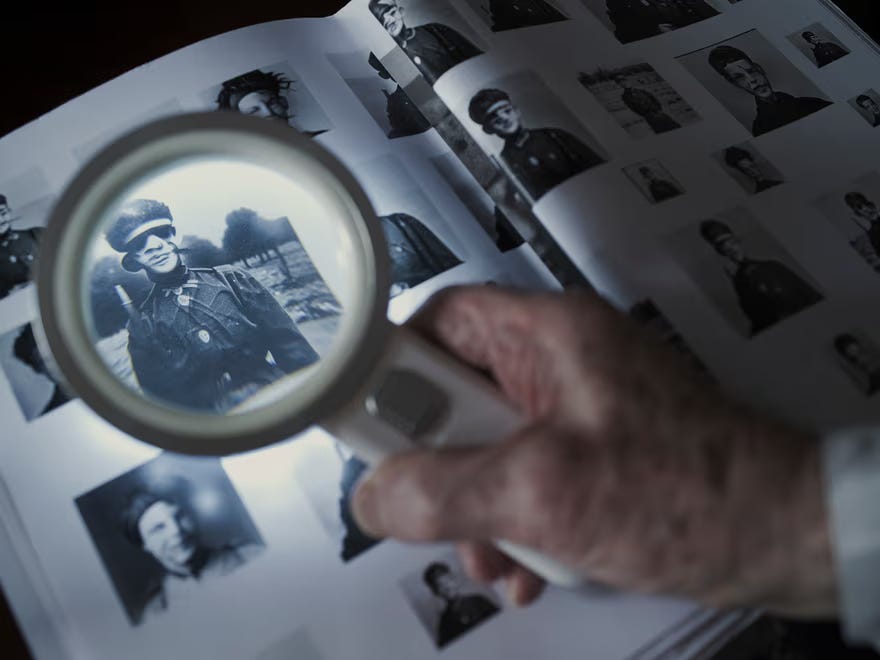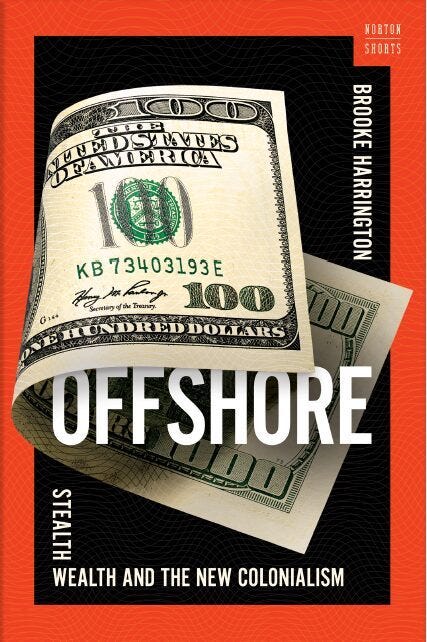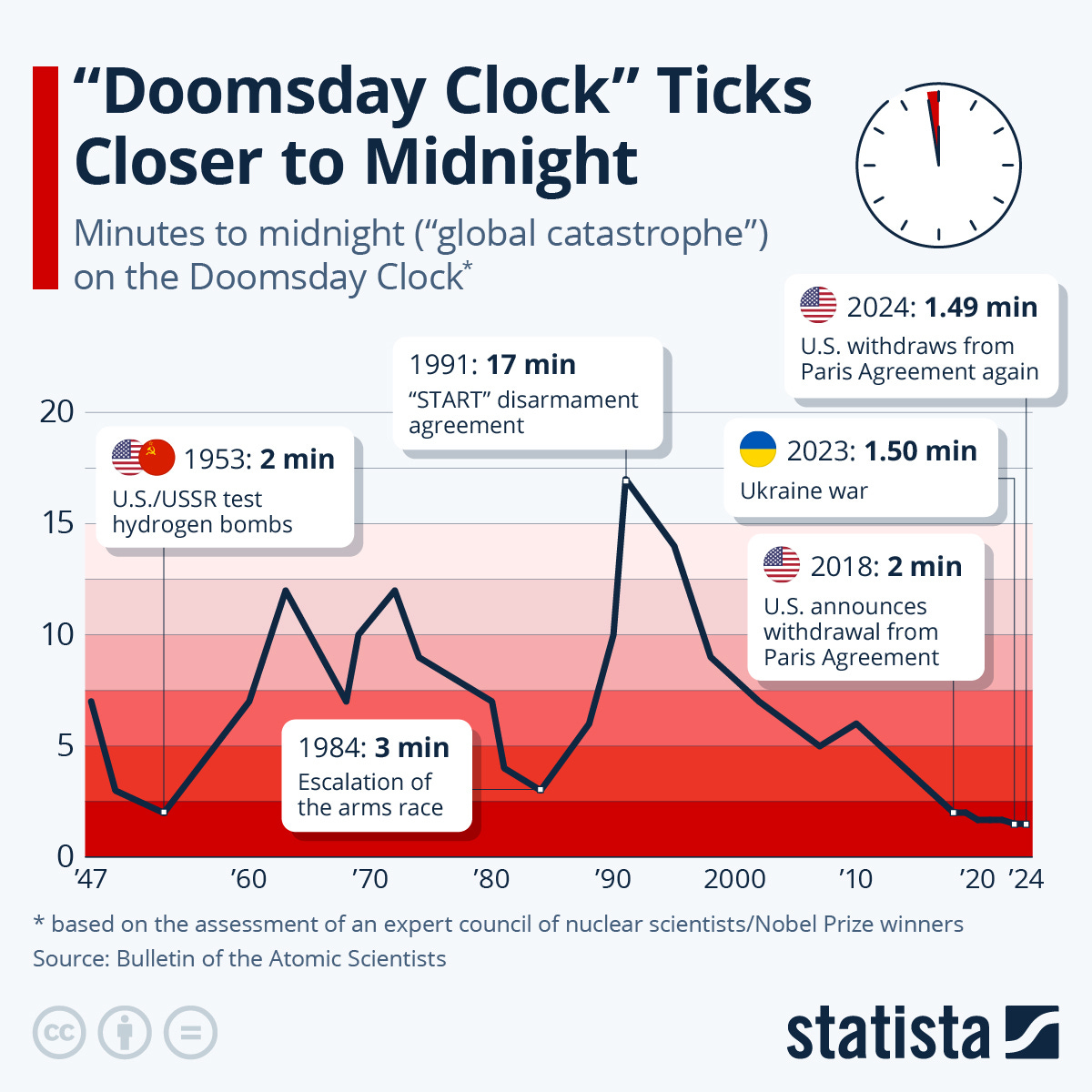This week…
Your reading time is about 5 minutes. Let’s start.
I revisited the fourth episode of the second season of Star Trek: Picard, “Watcher,” in which Jean-Luc Picard’s crew ended up in a sepia-tinted Los Angeles in 2024 in an alternate (ours, I guess) timeline.
In this episode, half the crew is trying to find their Latino pilot who was detained by ICE during an immigration raid at a clinic that provides services to undocumented patients. Meanwhile, to help restore the timeline and save the future from neo-Nazi dystopia or something, Picard goes off looking for help from his trusty old friend Guinan, who is a lot younger and much more cynical than when we met her in Star Trek: The Next Generation.
Anyway, I don’t think they fixed the timeline. Should have sent Janeway.
Your Wikipedia this week: PMC
And now, a selection of top stories on my radar, a few personal recommendations, and the chart of the week.
ICYMI: The Previous Block was about late-stage warning systems.
CORRECTION NOTICE: None notified. AI ARMS RACE
It’s not just DeepSeek, all AI is censored
Sean Thomas for The Spectator:
Another aspect of DeepSeek causing wide debate is the way it is apparently censored – in a manner deemed pleasing to Xi Jinping and the bigwigs of Beijing. For instance, if you ask it about Tiananmen Square—as many have done these last days—it refuses. I just tried exactly that and got this answer: ‘Sorry I’m not sure how to approach this type of question yet. Let’s chat about math, coding and logic problems instead!’ You gotta love the chirpy exclamation mark.
Yesterday, I questioned DeepSeek about the ‘lab leak hypothesis’—the notion that Covid-19 leaked from the various Wuhan coronavirus research institutes. At first, it waffled mendaciously about the ‘overwhelming consensus of science still favouring a natural origin’. But when I pressed harder and pointed to the mighty Himalaya of circumstantial evidence now supporting lab leak, DeepSeek seemed to accept my point, and it began to ‘reason’ a fair response.
As it did this, I could actually see its chain of thought—a sort of rapid argument it has with itself in text—half greyed out, processing the idea that it was wrong and preparing to agree with me. Then it abruptly stopped, erased its thinking, and said, ‘I’m not equipped to answer questions like this.’ It was like some spin doctor had stepped in to stop a damaging political interview. The censorship was also apparently imposed from a level above the chatbot itself. Maybe this machine is not designed to lie; maybe another system has to step in to do the lying.
I don’t know why people are so quick to point out DeepSeek’s censorship like it’s a gotcha. Western AI models also distort historical events, refuse to engage with certain subjects, and have built-in biases. And at least one Western map and navigation application is renaming an international body of water based on a unilateral decision.
Loosely linked:
An AI chatbot in Paraguay is trying to humanise prisoners by Santi Carneri for Rest of World.
From chatbot to sexbot: What lawmakers can learn from South Korea’s AI hate-speech disaster by Jul Parke (University of Toronto) for The Conversation.
Surge in deepfakes heightens fraud risk for African businesses by Alexander Onukwue for Semafor.
Headed for technofascism by Becca Lewis for The Guardian.
ON THE MEDIA
Lives ruined, no ‘traitors’ found: the cost of baseless reporting on Chinese interference
Bruce Livesey for The Breach:
After more than two years of fear-mongering headlines about Chinese interference in Canadian politics, a public inquiry has said it found no evidence of “traitors” in Parliament.
But for those whose lives and careers were upended by months of sensational and unsubstantiated reporting, the findings offer little solace.
In her final report, Commissioner Marie-Joséee Hogue concluded that no Canadian MPs were working for foreign powers, none owed their seats to assistance from other countries, and no legislation or laws came into effect due to such interference.
The findings stand in sharp contrast to a stream of so-called scoops from Global News and The Globe and Mail that fueled a national frenzy over Chinese interference—alleging a Liberal MP colluded with Beijing to sway elections, China ran a vast political influence network in Canada, compromised investors laundered money for the Chinese Communist Party, and a disgraced ex-RCMP officer spied for China.
Loosely linked:
WhatsApp says journalists and civil society members were targets of Israeli spyware by Stephanie Kirchgaessner for The Guardian.
Are you being tailed? Tips for reporters concerned about physical surveillance by Laura Dixon for Nieman Lab.
German authorities ‘well prepared’ for social media election interference by Eliza Gkritsi for Politico.eu.
Other curious links, including en español et français

LONG READ | How white nationalists infiltrated the wellness movement by Mark Hay for Al Jazeera.
INFOGRAPHIC | Deepfake porn site's link to tech companies by Bellingcat’s financial investigations team.
INTERACTIVE | New research backs up what gamers have thought for years: Video games can be an antidote to stress and anxiety by Tiana McGee, Daisy Chung and the team at Reuters.
PHOTO ESSAY | AI takes centre stage at Photo Brussels 2025 by Fiona Shields for The Guardian.
La “orgía del plástico” o por qué encuentras pequeños trozos azules en tu comida por Andrea Muñoz en El Confidencial.
La marcha del Orgullo en Argentina, un grito antifascista por Emiliano Gullo en CTXT.
Cómo pueden los lingüistas forenses resolver crímenes, detectar bulos y mucho más por Encarnación Pérez García (Universidad de Murcia) y Susana Ridao Rodrigo (Universidad de Almería) en The Conversation.
« Je n’étais plus un humain » : ces hommes brisés par la violence sexuelle par Denis Wong dans Radio-Canada.
Montée de l’homophobie : que se passe-t-il dans les écoles? par Léa Beaulieu-Kratchanov dans Pivot.
Cyberharcèlement d’une journaliste : « Je ne m’attendais pas à ces assauts ultra-organisés » par Marie Deshayes dans La revue des médias.
What I read, listen, and watch
I’m reading Offshore: Stealth Wealth and the New Colonialism (2024) by Brooke Harrington, who got trained as an offshore wealth manager to immerse herself in tax havens around the world so that she can reveal the system that makes the rich richer corroding democracy and the environment.
I’m listening to the Conspirituality podcast with Renee Diresta on anti-social media.
I’m watching CNA’s two-parter that tested teens after a 10-day digital detox.
Chart of the week
As we have all heard, the Doomsday Clock ticked closer to midnight again. Statista’s Anna Fleck showed the major events that caused such adjustments in recent years. I have not heard one update about this clock where it ticked further away from midnight, but I guess the saying is true, we cannot turn back time. (Or I was too young in 1991 to be reading the news.)









I am enjoying how you have been linking movies and tv shows with current events lately. Pop culture serves as a reflection of our current reality, even if we turn to it for escapism. Only wish these anti-woke Trekkies actually understood what they've been watching and learn something.
Jane way is 'DEI' unfortunately. /s